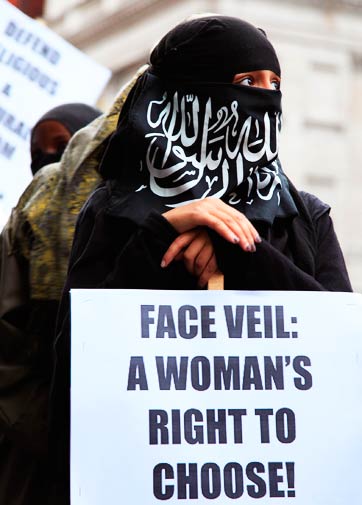Rainer Ebert
In 2011, a French law came into effect which makes it illegal to cover one’s face in public. Even though lawyers for the French government emphasize that the law also applies to non-religious face-veiling garments, such as balaclavas and hoods, it is clear that its principal target is Muslim clothing, particularly the burqa and the niqab. The legislative process that led to the law now widely known as the French burqa ban started shortly after then-President Nicolas Sarkozy declared that the Islamic burqa – which he thinks makes women “prisoners behind a screen” – is not welcome in France. Those who violate the law face fines of up to 150€, or lessons in French citizenship.
France now finds itself in the undesirable company of Saudi Arabia, Iran, and other countries that force women to dress in a particular way. A young French Muslim woman was not willing to accept that, and hence challenged the French burqa ban before the European Court of Human Rights (ECHR) in Strasbourg, arguing that it violates her rights to freedom of religion and expression. Last month, on the 1st of July, the ECHR rejected her argument and upheld the ban, reigniting troublesome calls for similar bans in multiple European nations that threaten the values of tolerance, multi-cultural diversity, and individual freedom which Europeans are rightly proud of. But not only Europe talks about the burqa. The debate over the ban has now even reached Bangladesh. Yesterday, Dr. A. Rahman, a fellow columnist at bdnews24.com, argued that the government of Bangladesh should consider following the French example. Given the complex and often emotional nature of the debate, it is important to put feelings and prejudices aside and carefully consider the arguments. What follows are some common arguments for the burqa ban. Let us evaluate them one by one. I will focus on France but the reader will find it easy to apply what I am about to say to other contexts as well.
First, it is sometimes argued that full-face veils cannot be tolerated because security requires people to show their faces in public. In 2010, for example, two men dressed in burqas robbed a post office in a Paris suburb. Security staff had let them in, believing them to be Muslim women. Once inside, they removed their head coverings and pulled out a gun. At best, isolated anecdotes like this make for an argument against face veils in security-sensitive places such as banks and airports, and most contemporary Islamic scholars agree that a woman may remove her face veil for visual identification if required for security purposes. But the fact that the face veil is inconsistent with reasonable security measures in certain public places is not a reason to ban it in all public places. Surely, an 18-year-old in a car is a much greater danger than a Muslim woman in a burqa on the sidewalk.
Secondly, some believe that the burqa and the niqab are a threat to French culture, and that the burqa ban is needed as a means to preserve that culture. There are about five million Muslims in France, more than in any other country in the European Union. Yet, it is estimated that less than 2,000 Muslim women wear a full-face veil, which amounts to no more than 0.04 percent of the Muslim population, or 0.003 percent of the total population. Are tiny fractions of a percent in unusual clothing enough to threaten French culture? Is the cultural identity of France so weak and feeble that it cannot tolerate a few women in burqas without falling apart? What is this culture that needs preserving anyway? Does it not include a passionate love for liberty and freedom that is threatened not by the burqa but the burqa ban? What about rap music, Italian cuisine, or the Sikh kirpan? Are these things next on the list of the French culture police?
Thirdly, the burqa ban is said to protect women from oppression. How this is supposed to work is a mystery that only the French parliament can fathom. Those who are forced to wear the burqa or the niqab by family members are more likely to be imprisoned at home than to be liberated as a result of the ban. Of course, we will never know that for certain, precisely because of the many women who just disappear behind closed doors. Not to mention the fact that all forms of physical coercion were illegal before the introduction of the burqa ban already. But not only women forced to stay at home have fewer freedoms with the ban in place. Those who cover their faces voluntarily now either comply with the ban and let the state determine their clothing, or refuse to comply and risk being harassed by law enforcers and overzealous wannabe police officers.
Lastly, and this was the basis of the ECHR’s decision, there is the complaint that the burqa and the niqab contradict a certain idea of “living together.” It is true that facial recognition and expression typically play an important role in human communication, but that does not mean that communication is impossible if the face is veiled. Anyway, there is no right to communicate with someone face to face, and the ban will not do much to facilitate dialogue between different faiths and cultures. Rather, it stigmatizes, and breeds resentment against, Muslims who already face increasing discrimination across Europe. If the goal is to reduce the polarization between “us” and “them” and bring about a better living-together, the means of choice should be more tolerance and understanding, rather than the legal imposition of the majority’s dress code.
The French burqa ban does not respond to any real security need, contradicts the West’s venerable liberal tradition, undermines the rights of women who voluntarily wear a face veil, does little to protect those who are forced to wear it, and divides people by feeding stereotypes and encouraging intolerance and wrongful discrimination. It is not the purpose of a liberal democratic state to dictate what people can and cannot wear. Rather, it is the responsibility of the state to protect every individual citizen’s right to govern his or her own life.
The ban and the ECHR’s decision to uphold it will have far-reaching consequences, and come at a time when a climate of suspicion against “others,” particularly Muslims, is rising in Europe. Belgium adopted a similar ban in 2011, and some towns in Spain and Italy and the Swiss canton of Ticino have joined the bandwagon, too. This, just like the Swiss ban on minarets and the abuse at Guantanamo Bay, is rightly perceived as Western hypocrisy and aids extremists worldwide.
In conclusion, the French ban on full-face veils is bad for women and bad for Europe, and everybody should hope that the illiberal trend it is a part of will revert sooner rather than later.
————————————————–
Rainer Ebert is a graduate student of philosophy at Rice University in Texas, and an Associate Fellow at the Oxford Centre for Animal Ethics.
Source: bdnews24










